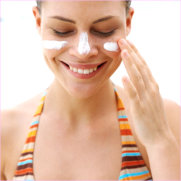 Most of us love the feel of the sun on our skin. We feel happier, more energised and healthier when we’re sun-kissed. However, before we expose ourselves to those UV rays we need to make sure we’re protecting our skin!
Most of us love the feel of the sun on our skin. We feel happier, more energised and healthier when we’re sun-kissed. However, before we expose ourselves to those UV rays we need to make sure we’re protecting our skin!
What are UV rays?
Ultraviolet radiation is a form of energy that comes from the sun. It is composed of various wavelengths of light that penetrate the Ozone layer and Earth’s surface. Exposure to some forms of UV radiation (UVA/UVB) has been reported to be a major risk factor in cases of skin cancers. Long term exposure can harm the skins DNA and damage collagen fibers advancing the signs of aging. Premature wrinkling is common in those who have been exposed to the sun over long periods of time, as are age spots and uneven complexions. UV radiation can cause cataracts and weaken the immune system.
Who’s at risk?Everyone. People with fairer skins are more likely to suffer damage from sun exposure but even people with darker skins need to take measures to protect themselves. Skins that have been burnt before, even in childhood, will be particularly sensitive to exposure.
 Protecting ourselves
Protecting ourselves
- Sunscreen When purchasing a sunscreen product you should think of it as an investment. The Sun Protection Factor (SPF) is a measure of a sunscreen's ability to prevent UVB from damaging the skin. How it works: If it takes 20 minutes for your unprotected skin to start turning red, using an SPF 15 product should prevent reddening 15 times longer (about five hours). The higher the SPF, the higher percentage of protection against UVB rays.
Sunscreen works best once absorbed so apply it around 20 minutes before heading outdoors and reapply regularly (every two hours) especially when swimming or perspiring.
Tip – Remember to protect your lips by applying a lip balm with an SPF of 15 or higher. - Cover up
Hats can protect the scalp, ears and hairline and shade the eyes from sunlight. Tightly-woven clothing helps deflect UV rays better than thin cotton. - Sunglasses
Plastic lenses that offer 100% UV protection are the best choice. Forget worrying about ‘panda eyes’ and remember you’re preventing the risk of cataracts in later life. Sunglasses also protect the delicate skin around the eyes from premature wrinkling. - Avoid midday sun The sun’s rays are strongest between around 10.30am and 3.30pm so avoid being exposed during this time. If you are outdoors cover up, apply sunscreen and try and stay in the shade where possible.
Glow Safe
If you have a fair complexion your skin contains fewer pigment producing cells which means you’re unlikely to achieve a tan. Why traumatise your skin trying when there are so many healthier options available?
Remember that you can achieve a ‘Faux Glow’ without any damage to your skin! Apply a gradual tan moisturiser each evening and not only will you be glowing but you will have avoided the painful effects of the sun - including soreness, luminescent red skin and the dreaded peeling.
It’s not all bad…
Benefits of sunshine
Sunlight can help heal psoriasis. With protection applied, exposure to sunlight is extremely beneficial for individuals with psoriasis.
Sunlight can ease mild depression.
There has been a lot of research on the link between sunlight and our moods. Studies have found that sunlight actually increases levels of a natural antidepressant in the brain. On sunny days, the brain produces more of the mood-lifting chemical serotonin than on darker days.
Sunlight contributes to bone health in older adults.
Our skin contains a cholesterol substance called provitamin D3 that reacts with the UVB rays in sunlight to form vitamin D3. Vitamin D stimulates the absorption of bone-strengthening calcium.
Sunlight can improve sleep quality.
When sunlight hits your eyes, your optic nerve sends a message to the gland in the brain that produces melatonin (a hormone that helps you sleep); the gland decreases its secretions of melatonin until the sun goes down again. In other words, exposure to sunlight during the day increases the natural production of melatonin at night. Low levels of melatonin production are linked to poor sleep quality, especially in older adults.